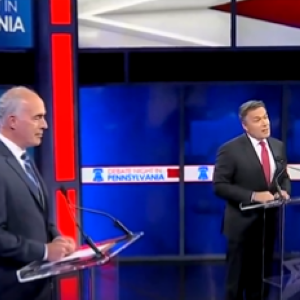There were no fireworks, but plenty of finger-pointing in the first debate between incumbent U.S. Senator Bob Casey Jr. (D-Pa.) and Republican Dave McCormick. The two candidates tangled on everything from the economy to abortion to the border.
McCormick portrayed the three-term senator as weak and ineffectual – more interested aligning with the Biden-Harris administration than standing up for Pennsylvania.
“Bob Casey went to the Senate to change Washington. Washington changed Bob Casey,” he argued.
The line earned praise from longtime Republican strategist Christopher Nicholas of Eagle Consulting. “McCormick was effective in telling voters that Bob Casey today is not the Bob Casey they first elected in 2006,” he told DVJournal.
McCormick criticized Casey’s votes for “wild spending bills” pushed by the White House. Economists have blamed the Inflation Reduction Act, the infrastructure law, and the American Rescue Plan for supercharging demand and driving up prices. The national debt hit a record $35 trillion over the summer.
Casey repeatedly portrayed McCormick as a rich businessman who didn’t care about Americans.
“This guy was running the largest hedge fund in the world, investing in China…he managed money for Saudi oil companies,” Casey said.
Casey repeated the familiar litany of criticisms Democrats have leveled against McCormick, attacking him for his work as CEO of Bridgewater and labeling him a carpetbagger for the years he spent living outside Pennsylvania.
“We’re supposed to believe this person who lied to the people of our state about where he lives?” Casey asked.
The 59-year-old McCormick grew up in Pennsylvania before leaving to attend West Point and serve in the U.S. Army. After returning to Pennsylvania in 1996, he moved to Washington, DC in 2005 to serve in the George W. Bush administration. His campaign said McCormick no longer owns or rents property in Connecticut.
Both candidates claimed to be strong on the border.
Casey supported the Biden-Harris administration’s recent decision to reinstate certain Trump-era policies on illegal border crossings. He added more Border Patrol officers were needed at the U.S.-Mexico border to inspect every vehicle.
He suggested the federal government could have passed a bipartisan border bill earlier this year, but blamed Donald Trump for it not passing. “My opponent opposes [the bill] because the leader of his party said, ‘Don’t support it,’” Casey said.
“I looked at that border bill. It’s a bad bill,” countered McCormick.
The Republican called the bill an “amnesty bill” instead of a border security bill. He also accused Casey of changing his tune on border security, calling out Casey’s opposition to a border wall during the Trump administration. He added it was time for leadership to “take on the cartels” across the border.
McCormick mentioned his two visits to the border and suggested Casey make his own trip. “I’ve been there more than the Senator and the Border Czar,” he quipped.
The pair did find common ground on the issue of the U.S. Steel-Nippon merger.
Casey said he wanted to make sure that unionized steelworker jobs stayed in Pennsylvania. He fretted that Japan-based Nippon could outsource jobs and devastate the local economy.
McCormick’s opposition was along national security lines. While he acknowledged Japan is an ally of the U.S., McCormick raised concern about Nippon’s operations in China, Iran, and Russia.
One of the most notable moments was when Casey was asked whether he believed President Joe Biden — suffering from age-related challenges — or Vice President Kamala Harris would be a better candidate for the Keystone State.
“I don’t know… we’ll never know the answer to that. The voters are going to make a decision,” he said.
McCormick used the comment as an example of Casey’s weakness. He said Casey stood by Biden when he could “hardly finish a sentence” then quickly switched to Harris when she became the Democratic nominee.
“He’s a 99 percent vote for his party… He’s shown no independence,” said McCormick.
Both candidates declared their own victories and celebrated their opponent’s defeat. Reviews broke down along party lines.
“He kept Senator Casey on the defensive for most of the debate,” longtime GOP strategist and Mercury Senior Vice President Vince Galko said of McCormick.
“Bob Casey just buried Republican Dave McCormick on the debate stage. Pulled zero punches,” wrote Democrat pundit and MSNBC contributor Brian Tyler Cohen on X.
The RealClearPolitics polling average gives Casey a four-point lead over McCormick. Several September polls, however, had the candidates tied.
Casey and McCormick will debate again on October 15 in Philadelphia.

